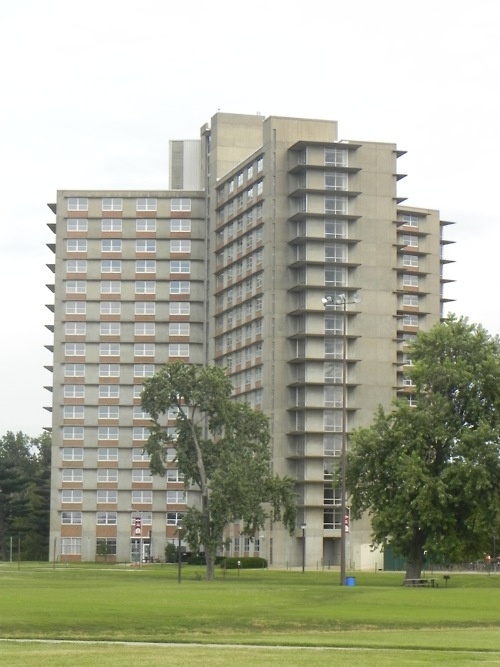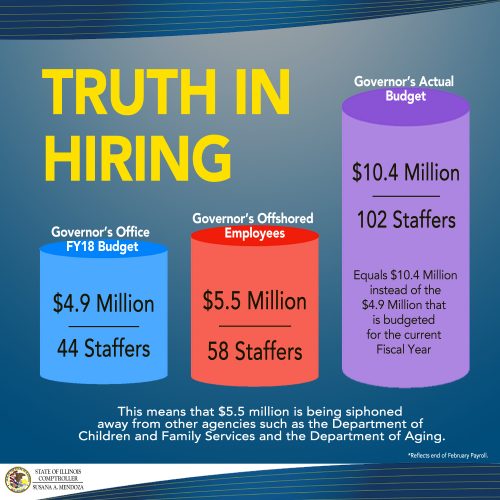auction
Student housing to be consolidated on West Side of SIU Campus
From SIU News Service
CARBONDALE – SIU Carbondale will bring students together in residence halls on the west side of campus this fall in order to increase student engagement, according to SIU Chancellor Carlo Montemago.
Currently, the campus has two major housing areas: the “towers,” which consists of two currently open high-rise residence halls, and a number of smaller, three-story residence halls on the west side of campus called Thompson Point.
“By bringing students together in Thompson Point, we can continue to build a tightly knit, engaged community,” Montemagno said. “It will also increase traffic to our Student Center, which should be a centerpiece of campus life.”
Building engagement with closer-knit communities
Montemagno acknowledged that enrollment declines make the move possible but says that the change is driven primarily by efforts to build engagement and enhance retention.
“As we rebuild enrollment in the years ahead, we will always have the option of having students on both sides of campus again,” he said. “For now, we can best serve students by making sure that they are part of a vibrant and active community.”
Jon Shaffer, director of University Housing, said the move will also create efficiencies that will help the university minimize future room and board costs for students.
“We can effectively serve students in one dining hall instead of two, for example,” he said.
Commitment to living-learning communities remains
Shaffer said that new students who have signed housing contracts for fall will not be affected, since they have not yet been assigned rooms. About 500 to 600 returning students have already selected rooms for the fall, and the housing office will reach out to them to work through changes.
He said the move will also affect the location of living-learning communities for students who share similar majors or interests. Currently, there are communities on both sides of the campus.
“We are continuing to grow the number of living-learning communities on campus,” Shaffer said. “While the location may change, our commitment remains the same.”
University Hall, campus apartments will remain open
In addition to the residence halls on the west side of campus, the university will continue to offer housing at University Hall, Wall and Grand Apartments and Evergreen Terrace.
The Gathering Place Snack Shop, currently housed in Grinnell Hall, will move to University Hall.
Bicentennial launches new video commercial, statewide media
CHICAGO — The Illinois Bicentennial Commission today released its first video commercial promoting the state’s 200th birthday. The :30 second spot is the center point of a statewide multimedia campaign named after the theme of the yearlong celebration: BORN, BUILT & GROWN in Illinois.
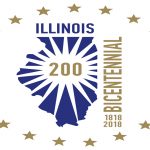 The campaign, which will run from now until the 200th birthday party on December 3, 2018, will showcase Illinois’ influence on the worlds of music, sports, agriculture, literature, commerce, history, technology and innovation, transportation, art and architecture, among others.
The campaign, which will run from now until the 200th birthday party on December 3, 2018, will showcase Illinois’ influence on the worlds of music, sports, agriculture, literature, commerce, history, technology and innovation, transportation, art and architecture, among others.
The content for the effort is pre-produced and being distributed statewide for carriage on television, radio, digital and social media. The messages can be run as public service announcements by media outlets or packaged by outlets for sponsorship by local advertisers. The Illinois Broadcasters Association is the distributor.
“We’re delighted with this creativity and the opportunity it now provides our association’s members in seeking local sponsorships,” remarked Dennis Lyle, president and CEO, Illinois Broadcasters Association.
The content was produced by Chicago-based AnswersMedia and paid for with private funds.
The Bicentennial program incorporates material supplied by Abraham Lincoln Presidential Library and Museum, Illinois Association of Museums, Illinois Department of Agriculture, and the Illinois State Museum.
Gov. Rauner signs bipartisan legislation to ensure continued access to quality medical care for state’s most vulnerable
Signs SB 1773, protecting safety net and rural hospitals while sustaining Medicaid program
CHICAGO – Governor Bruce Rauner signed bipartisan legislation today that protects safety net and rural hospitals while ensuring continued federal support for quality healthcare to more than three million Illinoisans.
Senate Bill 1773 ensures the state will continue to receive federal matching funds to offer services for Medicaid beneficiaries through the Hospital Assessment Program, which brings in $3.5 billion annually.
The Hospital Assessment Program is set to expire at the end of June. A bipartisan group of legislators worked with the Illinois Health and Hospital Association and the Department of Healthcare and Family Services (HFS) to redesign the program, create a more equitable reimbursement process, and ensure more efficient use of taxpayer dollars.
Our teams worked hard to make sure our most vulnerable citizens can continue to receive quality medical services and to keep hospitals in underserved communities,” Gov. Rauner said. “I’d like to thank all the legislators, state officials, and stakeholders who worked to restructure the program. Their unwavering dedication will help keep the Medicaid program sustainable for the future.”
The state currently uses old data sets, sometimes based on care that was provided as far back as 2005, to reimburse hospitals for Medicaid services. The new model will use updated data and also ensure that more of the reimbursements are based on actual services hospitals provide. It also dedicates more than $260 million to help hospitals transform their operations to better serve their communities, such as offering more urgent and outpatient care.
“This legislation increases dynamic, claims-based payments so that dollars follow services for Medicaid patients, and it updates outdated utilization data that doesn’t reflect the current delivery of services,” said Felicia Norwood, Director of HFS. “Healthcare delivery and where our beneficiaries receive their care has changed dramatically over the last ten years and our hospital reimbursement structure should recognize these changes. The new program draws down as much federal revenue as we believe is permissible and helps hospitals transition to more effective healthcare delivery models over time.”
The Federal government will need to sign off on the new terms of the program before it can take effect.
“Hospitals are major engines of economic growth in our communities. The changes we were able to negotiate to the assessment program will provide for a more fair funding of Medicaid dollars to hospitals based on actual patients seen and severity of the treatment,” said state Sen. Dave Syverson (R-Rockford), one of the lead negotiators of the Medicaid hospital funding plan.
“In a true achievement, Republicans and Democrats have come together to preserve Illinois’ share of vital Medicaid hospital funding and maintain critical health care services for our most vulnerable population, including seniors, the disabled, single mothers and children from low-income families. I commend my colleagues on the House and Senate legislative working group on a job well done along with members from the IHA, the MCO’s, Director Norwood of HFS, and leading health care professionals from across the state,” said state Rep. Patti Bellock (R-Hinsdale).
“I appreciate the bipartisan cooperation we had developing this legislation and am delighted the governor acted quickly to sign it. I urge the federal government to review this proposal immediately so that service to patients in Illinois will not be disrupted. These hospitals play a vital role in our communities and serve some of the neediest Illinoisans,” said state Sen. Heather Steans (D – Chicago)
“Today we are reforming and modernizing healthcare funding in Illinois and bringing $3.5 Billion into the state. Every hospital in Illinois benefits from this program, with priorities on safety-net and rural critical access hospitals, increased funding for behavioral health, trauma services, perinatal care and hospital transformations. I want to thank my Republican and Democratic colleagues and the Illinois Hospital Association for collaborating on this once in a decade effort,” said state Rep. Greg Harris (D-Chicago).
“The changes to Illinois’ Hospital Assessment Program are important in two major ways: first, the limited yet critical Medicaid dollars available will go to the people who truly need it the most. Secondly, this not only helps patients, it supports taxpayers, as public dollars will be spent more efficiently and effectively. This is a major step in the right direction that will enhance our Medicaid program for everyone involved,” said state Sen. Dale Righter (R-Mattoon).
“The hospital assessment program is the lifeblood of healthcare in Illinois. The modernized assessment allows healthcare dollars to be spent where they should be -with the patient. I’m proud to have served on the bipartisan working group to deliver meaningful reform that will transform Illinois healthcare for years to come,” said state Rep. Ryan Spain (R-Peoria).
“This bill supports Medicaid patients by improving rates paid to providers and ensuring that money follows the patient. The bill also creates a Hospital Transformation Committee that will help reconfigure our healthcare system to ensure that we’re meeting the needs of our communities,” said state Rep. Tom Demmer (R-Dixon).
“On behalf of hospitals and health systems across the state, the Illinois Health and Hospital Association commends the Governor, the General Assembly including the Legislative Medicaid Work Group, and the Department of Healthcare and Family Services for taking action to continue and modernize the Hospital Assessment Program. This essential and vital program, which brings the State $3.5 billion annually, helps ensure that Medicaid beneficiaries and all patients in Illinois have access to the quality healthcare they need when they need it” said IHA president and CEO A.J. Wilhelmi.
“This updated and redesigned hospital assessment program is of critical importance to our hospitals, and more importantly to our patients, families and communities we are privileged to serve. This change helps ensure that we are able to continue providing high quality healthcare to all Illinoisans” said the IHA’s Bill Santulli.
The governor also signed SB 1573, related to Medicaid managed care operations and reporting
Contest to Design Illinois’ Bicentennial Medallion Now Open
SPRINGFIELD – Illinois State Treasurer Michael Frerichs announced the Bicentennial Coin Contest, encouraging individuals to submit a design for the coin that will be created and distributed to commemorate the Illinois Bicentennial.
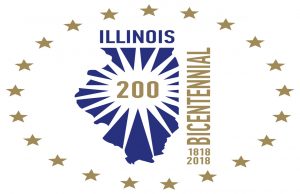 “A bicentennial coin is a great way to commemorate Illinois’ upcoming 200th birthday,” Frerichs said. “We call upon Illinoisans to tap their creativity and submit a design that captures the beauty of our state, its illustrious history, and depicts the great advantages Illinois has to offer.”
“A bicentennial coin is a great way to commemorate Illinois’ upcoming 200th birthday,” Frerichs said. “We call upon Illinoisans to tap their creativity and submit a design that captures the beauty of our state, its illustrious history, and depicts the great advantages Illinois has to offer.”
The treasurer’s office will accept electronic submissions for the Bicentennial Coin Contest from Illinois residents. Each design should depict an aspect of Illinois or Illinois history. One entry, per contestant, can be submitted now through May 1, 2018 at www.IllinoisCoinContest.com.
The winning design will be used for the commemorative bicentennial coin. To pre-order a commemorative bicentennial coin, visit www.IllinoisCoinContest.com and click on the “medallion pre-sale” graphic.
The public will have an online opportunity to vote on the top five designs in June. A final winner will be announced on June 18, 2018.
The Commemorative Medallions Act authorizes the state treasurer to issue medallions or coins to commemorate popular contemporaneous events of statewide interest. The State of Illinois will celebrate its 200th birthday on December 3, 2018.
To read all the rules, terms, and legal conditions associated with this contest, visit our website at www.IllinoisCoinContest.com. For more information and to follow updates about the Illinois Bicentennial events and celebrations, visit www.illinois200.com.
ATTORNEY GENERAL MADIGAN ANNOUNCES FINAL TOP 10 LIST OF CONSUMER COMPLAINTS
Chicago — Attorney General Lisa Madigan announced her office’s list of Top 10 consumer complaints for 2017. Since taking office in 2003, Madigan’s office has mediated nearly 400,000 formal complaints from consumers across Illinois, fielded hundreds of thousands of phone calls and inquiries every year and recovered billions in direct relief to Illinois consumers through litigation and mediation.
 Last year, Madigan’s office received 24,669 complaints, and identity theft ranked No. 1 for the first time since 2007, with 2,511 complaints. The jump, in part, is due to the massive data breach sustained by Equifax, one of the largest credit reporting agencies that compromised information for nearly 148 million Americans. In addition, education-related complaints made another big increase, jumping to No. 2 on the list with 2,399 complaints, further reflecting the country’s persistent student loan debt crisis.
Last year, Madigan’s office received 24,669 complaints, and identity theft ranked No. 1 for the first time since 2007, with 2,511 complaints. The jump, in part, is due to the massive data breach sustained by Equifax, one of the largest credit reporting agencies that compromised information for nearly 148 million Americans. In addition, education-related complaints made another big increase, jumping to No. 2 on the list with 2,399 complaints, further reflecting the country’s persistent student loan debt crisis.
Joining Madigan today to discuss this year’s Top 10 list were Todd Kossow, Director of the Federal Trade Commission (FTC)’s Midwest Region, Steve Bernas, President and CEO of the Better Business Bureau (BBB) of Chicago and Northern Illinois and Bill Hedrick, Inspector in Charge of the U.S. Postal Inspection Service in Chicago.
“Every year, my Top 10 list shows that scam artists, predatory companies and cyber criminals devise schemes to steal peoples’ money,” Madigan said. “This year’s Top 10 list confirms that contending with financial challenges such as identity theft, student loans and other personal debt are the major issues confronting Illinois residents. My office will continue to aggressively pursue consumer fraud and provide people with the help they need.”
Attorney General Madigan has fought aggressively to protect consumers from identity theft amid a series of unprecedented data breaches at some of the country’s largest companies and retailers. Madigan’s Identity Theft Unit at 1-866-999-5630 (TTY: 1-877-844-5461) provides one-on-one assistance to victims of identity theft and data breaches and has helped over 44,000 people remove over $29 million worth of fraudulent charges from their credit.
Top 10 Breakdown
Madigan’s annual Top 10 list of consumer complaints ranks every complaint her office receives on a range of topics. Madigan’s Consumer Fraud Bureau returned more than $46 million in savings through litigation and mediation to Illinois consumers in 2017. In addition to identity theft and education-related complaints, Madigan noted other categories that topped her list of complaints involved consumer debt and home repair.
|
CATEGORY |
# OF COMPLAINTS |
| 1. Identity Theft (credit cards, data breaches, utilities, government document fraud) |
2,511 |
| 2. Education (student loan debt, loan counseling, for-profit schools) |
2,399 |
| 3. Consumer Debt (collection agencies, mortgages, banks) |
2,395 |
| 4. Construction/Home Improvement (remodeling, roofs and gutters, heating and cooling, plumbing) |
2,113 |
| 5. Telecommunications (cable and satellite TV, telemarketing, cell phones, phone service and repairs) |
2,031 |
| 6. Promotions/Schemes (phone scams, lottery scams, investment schemes, phishing) |
2,004 |
| 7.Used Auto Sales (as-is used cars, financing, advertising, warranties) |
1,728 |
| 8. Internet/Mail Order Products (internet and catalog purchases, TV and radio advertising) |
1,071 |
| 9. Motor Vehicle/Non-Warranty Repair (collision, engines, oil changes and tune-ups) (collision, engines, oil changes and tune-ups) |
656 |
| 10. New Auto Sales (financing, defects, advertising) |
629 |
For more information, visit Madigan’s website or contact her office about consumer fraud issues.
Illinois Celebrates AmeriCorps Week
SPRINGFIELD – Governor Bruce Rauner has proclaimed March 11-17, 2018 AmeriCorps Week in Illinois. Each year, the nation celebrates the service that tens of thousands of Americans perform through AmeriCorps. The Serve Illinois Commission uses this week to salute the AmeriCorps members and alums for their hard work and thank the community partners that support them.
 “Each year, thousands of AmeriCorps members in Illinois take time out of their busy lives to help their neighbors,” said Governor Rauner. “These volunteers work to keep children safe, the environment clean, help people find jobs, and much more. AmeriCorps Week in Illinois reminds us to thank AmeriCorps members and alums for their service, to thank AmeriCorps’ community partners, and encourage more people to join in service.”
“Each year, thousands of AmeriCorps members in Illinois take time out of their busy lives to help their neighbors,” said Governor Rauner. “These volunteers work to keep children safe, the environment clean, help people find jobs, and much more. AmeriCorps Week in Illinois reminds us to thank AmeriCorps members and alums for their service, to thank AmeriCorps’ community partners, and encourage more people to join in service.”
AmeriCorps provides opportunities for adults of all ages and backgrounds to serve through a network of partnerships with local and national nonprofit groups. From neighborhood cleanups and building homes, to tutoring children and helping the homeless, Illinois’ 2,600 AmeriCorps members are celebrating by doing what they do best – serving their communities.
“When faced with a community need, Illinois’ AmeriCorps members step up,” said Serve Illinois Commission Executive Director Scott McFarland. “These people from all walks of life come together in the spirit of service, and Illinois owes each of them a great debt.”
Since 1994, more than 39,000 Illinoisans have taken the AmeriCorps pledge to “get things done for America.” Those members have given back more than 55 million hours to their communities, which equates to more than $1.4 billion in impact. During the past 24 years, Illinois AmeriCorps members have earned more than $131 million in education awards to pay for college or eliminate student debt. For every dollar invested by the federal government, Illinois communities receive $3.50 in service. For every dollar the state invests, AmeriCorps brings in $124 worth of volunteer impact!
Illinois AmeriCorps by the Numbers
• 2,628 AmeriCorps Members Currently Serving
• 209,286 Youth Serviced Last Year
• 39,744 Veterans and Military Family Members Served Last Year
• 18,219 Additional Volunteers Recruited Last Year
• 39,000 Illinoisans Served in AmeriCorps since 1994
• 55,000,000 AmeriCorps Hours Contributed since 1994
• $131,000,000 Earned in Education Awards since 1994
• $1,427,250,000 Impact to Illinois Communities since 1994
The Serve Illinois Commission is a 40-member (25 voting and 15 non-voting), bi-partisan board appointed by the Governor and administered by the Illinois Department of Public Health. Its mission is to improve Illinois communities by enhancing volunteerism and instilling an ethic of service throughout the state.
For a full listing of AmeriCorps programs and information on how to find a volunteer opportunity any time of the year, please visit www.Serve.Illinois.gov.
Illinois Surpasses Old Peak Employment Level
Illinois Unemployment Rate Dips in January
CHICAGO–The Illinois Department of Employment Security (IDES) announced today that the unemployment rate decreased by -0.1 percentage point to 4.8 percent in January and nonfarm payrolls increased by +200 jobs over-the-month, based on preliminary data provided by the U.S. Bureau of Labor Statistics (BLS) and released by IDES. December jobs were revised down to show a slight drop (-700 jobs) rather than a slight gain as initially reported (+1,500 jobs).
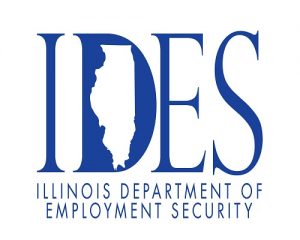 Today’s report incorporates annual benchmark revisions for nonfarm payrolls as well as labor force statistics. Nonfarm payrolls were revised slightly higher for 2016 and 2017. The revised December 2015-2016 growth is now +0.6% and the revised December 2016-2017 growth is now +0.7% (pre-benchmark these were +0.3% and +0.5%, respectively). Revisions to labor force statistics resulted in a slightly higher labor force participation rate, employment participation rate and unemployment rate for calendar year 2017.
Today’s report incorporates annual benchmark revisions for nonfarm payrolls as well as labor force statistics. Nonfarm payrolls were revised slightly higher for 2016 and 2017. The revised December 2015-2016 growth is now +0.6% and the revised December 2016-2017 growth is now +0.7% (pre-benchmark these were +0.3% and +0.5%, respectively). Revisions to labor force statistics resulted in a slightly higher labor force participation rate, employment participation rate and unemployment rate for calendar year 2017.
The revised nonfarm payroll figures revealed that Illinois surpassed its prior business cycle peak from September 2000 level in June 2017. In January 2018, Illinois nonfarm payrolls are at a new high; 0.4% above the prior peak.
“Illinois job growth over the past year has been spurred by a resurgence in manufacturing.” said IDES Director Jeff Mays. “Over the year, manufacturing payrolls accounted for close to half of the total increase of jobs in Illinois.”
“This new peak employment milestone is a testament to the work that has been done by the Rauner Administration to encourage competition, create jobs and reduce burdensome bureaucracy,” said Illinois Department of Commerce and Economic Opportunity Director Sean McCarthy. “Just last week, our state was named in the top three for site selection and our strengths within identified industries, like manufacturing, are elevating our efforts to attract investment to Illinois. It has never been more clear to employers across the world that Illinois is open for business.”
In January, the three industry sectors with the largest gains in employment were: Leisure and Hospitality (+4,000); Education and Health Services (+1,700); and Financial Activities (+1,300). The three industry sectors with the largest payroll declines were: Trade, Transportation & Utilities (-2,100); Professional & Business Services (-1,800); and Construction (-1,100).
Over-the-year, nonfarm payroll employment increased by +47,100 jobs with the largest gains in these industry sectors in January: Manufacturing (+20,200); Leisure and Hospitality (+13,900); and Education and Health Services (+6,200). The industry sectors with the largest over-the-year declines include: Information Services (-3,400); Trade, Transportation and Utilities (-3,300); and Other Services (-400). Illinois nonfarm payrolls were up +0.8 percent over-the-year in sharp contrast to the nation’s +1.5 percent over-the-year gain in January.
The state’s unemployment rate is +0.7 percentage points higher than the national unemployment rate reported for January 2018, which held at 4.1 percent. The Illinois unemployment rate is down -0.4 percentage points from a year ago when it was 5.2 percent. The Illinois jobless rate last stood at 4.8 percent in May 2007.
The number of unemployed workers dipped -2.1 percent from the prior month to 311,500, down -8.5 percent over the same month for the prior year. The labor force decreased -0.1 percent over-the-month and also over the prior year. The unemployment rate identifies those individuals who are out of work and are seeking employment.
An individual who exhausts or is ineligible for benefits is still reflected in the unemployment rate if they actively seek work. To help connect jobseekers to employers who are hiring, IDES’ maintains the state’s largest job search engine, IllinoisJoblink.com (IJL), which recently showed 63,832 posted resumes with 185,983 jobs available.
COMPTROLLER MENDOZA AND BIPARTISAN LEGISLATIVE GROUP INTRODUCE “TRUTH IN HIRING” AC
Transparency initiative would end long-standing practice of “offshoring” Governor staff salaries to state agencies to mask the Governor’s budget
SPRINGFIELD — Illinois Comptroller Susana A. Mendoza joined State Senator Andy Manar, D-Bunker Hill, State Representative Christian Mitchell, D-Chicago, State Representative David McSweeney, R-Barrington Hills, and State Representative Greg Harris, D-Chicago, Thursday to introduce the “Truth in Hiring” Act to bring all “offshored” employees of the Governor’s office back into the Governor’s budget.
For too long, Illinois governors – Democratic and Republican – have engaged in the deceptive practice of “offshoring.” The expression comes from the practice of rich people hiding their assets in offshore accounts, in tax havens like the Cayman Islands or Panama, to avoid paying taxes on them.
Illinois governors “offshore” their employees’ salaries to other agencies — for example, paying an education advisor $250,000 from the Department of Human Services; or a deputy chief of staff $140,000 from the Illinois State Police’s budget — to mask the true size of the Governor’s budget.
The most recent payroll shows only 44 of Governor Rauner’s staffers are actually paid from the Governor’s budget. MOST of his staff – 58 people – are hidden in other agency payrolls. If the Governor were honestly reporting all the people working in his office, he would have to disclose his office budget is more than $10 million, instead of the $4.9 million that is budgeted for the current fiscal year.
“That’s more than $5 million being secretly taken away from agencies that need it, like the Department of Children and Family Services that investigates child abuse; or the Department of Aging that cares for Illinois’ seniors,” Comptroller Mendoza said. “This ill-advised practice is silently siphoning money from health care, environmental protection, juvenile justice, economic development and public safety.”
The Truth in Hiring Act, (HB5121; SB3233) simply says that if an employee works in the Governor’s office, they will be paid from the Governor’s payroll. Their salary will be counted in the Governor’s budget. Their salary will not be pulled from agencies that are supposed to protect the most vulnerable or put state troopers on the highways.
“Offshoring is wrong. It was wrong when Governor Quinn did it. It was wrong when Governor Blagojevich did it. It was wrong when Governor Ryan did it. And it’s still wrong when Governor Rauner does it,” Comptroller Mendoza said. “This deceptive practice needs to stop.”
“Every time a governor shifts a new, unexpected six-figure salary onto a state agency’s plate, dollars that had been prioritized for important purposes – economic development, senior services and child protection, to name a few – are being diverted to a paycheck instead,” Senator Manar said. “Governors should understand the importance of being transparent about their expenses. Taxpayers who foot the bill for government, and frankly the lawmakers who determine the appropriations for state agencies, deserve that accountability.”
“This practice subverts the appropriations process. It takes money away from state agencies that protect children, the environment and public safety,” Representative Mitchell said. “This governor, and any future governors, should present the true cost of their staff in their office’s budget and make the case for why they need that level of funding.”
To be clear, this initiative is not intended to criticize employees who have found themselves offshored. In many cases they accepted jobs with the governor’s office not knowing their salaries would be offshored to other agencies.
This initiative follows Comptroller Mendoza’s Debt Transparency Act, which passed last year with unanimous or near-unanimous overrides. The state is already seeing the benefits of that reform as legislators on both sides of the aisle have more up-to-date numbers to craft a budget with and regular citizens have a clearer picture of the state’s finances.

